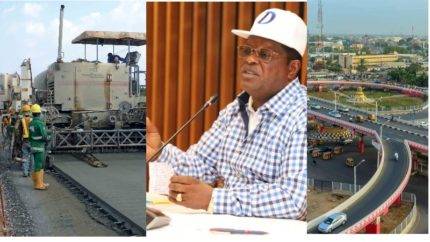The Minister of Works, David Umahi, has unveiled a comprehensive plan that underscores the Federal Government’s commitment to revolutionizing Nigeria’s road infrastructure. Umahi revealed that a staggering $35 billion is required to initiate the construction of concrete roads across the nation. This ambitious initiative aims to address the long-standing challenges of road quality and durability, presenting a paradigm shift in the country’s approach to transportation infrastructure.
David Umahi emphasized the strategic role of the moribund Ajaokuta Steel Company in this endeavor, stating that it will provide a significant portion—16 per cent—of the steel materials essential for the construction of concrete pavements. This revelation came to light during a crucial meeting between the Minister of Works and the Minister of Steel Development, Shuaib Audu, held at the ministry headquarters in Abuja. The meeting highlighted the need for coordination, cooperation, and coherence in executing the Federal Government’s action plans for national development.
Funding Strategy and Commercial Bank Partnership
Addressing the financial aspect of this monumental project, Minister of works, David Umahi, outlined the funding strategy, indicating that the required $35 billion would be sourced through a strategic partnership with a commercial bank. This approach is seen as a proactive step to expedite the commencement of the project, considering potential delays if solely reliant on government funding. The Minister clarified that the partnership would need the endorsement of the Federal Executive Council, emphasizing the importance of aligning financial decisions with the broader government agenda.
David Umahi‘s pragmatic approach involves a detailed analysis of the Return on Investment (ROI) and potential profits that could be generated from the project. He acknowledged the necessity of factoring in bank interest and underscored the viability of the proposed partnership with a commercial bank. This move not only aligns with the government’s commitment to infrastructure development but also reflects an innovative financing strategy to bring the ambitious plan to fruition.

Concrete Roads and Ajaokuta Steel Company Integration
The minister expounded on the integration of Ajaokuta Steel Company in the concrete road construction, revealing that approximately 16 per cent of the project’s materials would be sourced from the moribund steel facility. This integration holds significant implications for the revival of Ajaokuta Steel, showcasing a multi-pronged approach to national development. The use of steel in concrete roads is expected to enhance durability, providing a sustainable solution to Nigeria’s perennial road maintenance challenges.
David Umahi‘s emphasis on the synergy between the Works and Steel Development Ministries underscores the interconnectedness of various sectors in achieving holistic national development. This collaborative effort not only addresses infrastructure needs but also contributes to the revitalization of critical industrial assets, such as the Ajaokuta Steel Company.
Regulatory Approval Process and Federal Executive Council
The Minister’s announcement also shed light on the regulatory approval process required to initiate this colossal project. David Umahi outlined that the partnership with the commercial bank would need the formal endorsement of the Federal Executive Council, a pivotal step in aligning the initiative with broader government policies and garnering necessary support. This transparent approach ensures that major financial decisions are subject to due diligence and scrutiny, aligning with principles of good governance.
The involvement of the Federal Executive Council in approving the partnership signifies a commitment to transparency and accountability, reflecting the government’s dedication to responsible financial management. As the project moves through the regulatory approval process, it sets a precedent for other ambitious infrastructure initiatives in Nigeria.
Economic Impact and Return on Investment
Beyond the immediate infrastructural benefits, David Umahi touched upon the economic impact of the concrete road construction project. The Minister highlighted the potential return on investment, showcasing a comprehensive analysis that includes factors such as profitability, job creation, and broader economic stimulation. This approach positions the project not just as a necessary infrastructure upgrade but also as a strategic investment in Nigeria’s economic growth.
Umahi’s emphasis on the economic benefits reinforces the government’s commitment to projects that yield both short-term and long-term gains. By factoring in the project’s potential to stimulate economic activities, the Minister provides a holistic perspective that resonates with stakeholders and the general public.
David Umahi Touts Presidential Endorsement and National Development Vision
The ultimate success of this ambitious initiative hinges on securing the endorsement of the highest executive authority—Mr. President. David Umahi reiterated that if the proposed partnership with the commercial bank receives the Federal Executive Council’s endorsement, it would signify President’s commitment to fulfilling promises and driving impactful change. This aligns with the broader vision for national development, signaling a proactive approach to addressing critical infrastructure needs and fostering economic growth.
David Umahi‘s acknowledgment of the importance of presidential endorsement underscores the collaborative nature of governance and the interconnectedness of various ministries and government bodies. As this proposal advances through the approval process, it represents a significant step towards realizing a transformative vision for Nigeria’s infrastructure and economic development.
Table of Contents
Discover more from OGM News NG
Subscribe to get the latest posts sent to your email.














